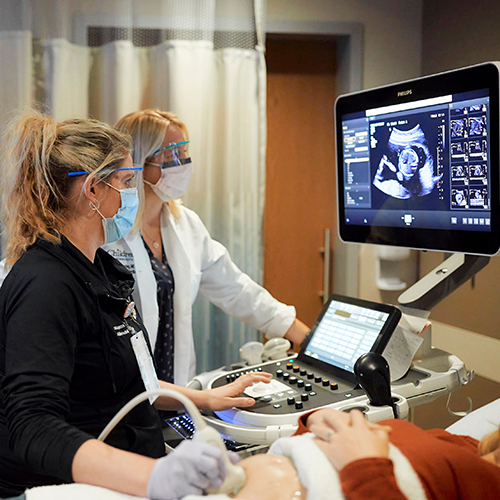Early detection of congenital heart problems saves lives and allows families to prepare for what’s ahead. The American Heart Association publication on the Diagnosis and Treatment of Fetal Cardiac Disease has outlined the following factors associated with increased risk of congenital heart disease in the fetus.
Detecting CHD
Use these factors when evaluating a pregnant woman and screening for a healthy fetus to help detect CHD:
Maternal factors
- Pregestational DM (preconception metabolic control may affect risk) or DM identified in the first trimester.
- Gestational diabetes mellitus with HbA1c > 6%.
- Phenylketonuria (preconception metabolic control may affect risk).
- Lupus or Sjögrens only if SSA/SSB autoantibody positive:
- Increased risk with maternal hypothyroidism or maternal vitamin D deficiency;
- With prior affected child with CHB or neonatal lupus, risk increased.
- Medication exposures: Teratogens – anticonvulsants, lithium, ACE inhibitors, retinoic acids, vitamin A (>10,000 IU retinol/d), SSRIs, Vitamin K antagonists, NSAIDs.
- Maternal infection.
- Use of assisted reproduction technology.
Family history
- First- or second-degree relative with structural cardiac disease.
- First- or second-degree relative with disease disorder, or syndrome with mendelian inheritance associated with structural cardiac disease (ie. hypertrophic cardiomyopathy, Marfan or Ehler-Danlos syndromes).

Fetal factors
- Suspected cardiac abnormality on obstetric ultrasound.
- Rhythm abnormalities: tachycardia, bradycardia, irregular rhythm.
- Noncardiac abnormality.
- Known or suspected chromosomal abnormality.
- Increased NT ≥ 3.5mm.
- Abnormality of umbilical cord, placenta, or intra-abdominal venous anatomy.
- Monochorionic twinning.
- Hydrops fetalis.
Additional resources
- Learn more about congenital heart disease from The Midwest Fetal Care Center.
- Learn more about the fetal cardiology program at Children’s Minnesota.
- For 24/7 assistance with maternal fetal consultations, referrals or admissions, please call: (855)693-3825.
Stephanie Hoff